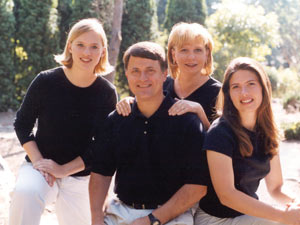An Interview with Randy and Nanci Alcorn - Blog - Eternal Perspective Ministries
Twenty-five years ago, Randy and Nanci Alcorn stood at a crossroads. An abortion clinic had recently won a lawsuit against Randy for his participation in peaceful, nonviolent rescues of unborn children, and he could not make more than minimum wage without 25 percent of his income being taken by the abortion clinic. As a matter of conscience, Randy resigned as a pastor of the church he and Nanci helped start thirteen years earlier. It was a job he loved, and the Alcorns depended on it.
The future looked bleak for a while. But what others intended for evil, God intended for good (Genesis 50:20). Those trying circumstances led to the founding of Eternal Perspective Ministries (EPM), a nonprofit ministry that allowed the Alcorns to pursue things close to their hearts.
In this interview, Randy and Nanci recall God’s faithfulness to their family and to this ministry in the years since EPM was founded. —Stephanie Anderson, EPM staff
Take us back 25 years. Your family had just come through a stressful few years. What emotions were you feeling at EPM's beginning?
 Nanci: The prevailing feeling was not knowing what was ahead. We had faith in God and knew He had a plan. But sometimes, speaking from other experiences, that plan isn’t your favorite thing to go through. There were a lot of unknowns and huge question marks about what was in front of us: How were we going to have an income? Would our kids still be able to attend their Christian school? Were we going to lose our house?
Nanci: The prevailing feeling was not knowing what was ahead. We had faith in God and knew He had a plan. But sometimes, speaking from other experiences, that plan isn’t your favorite thing to go through. There were a lot of unknowns and huge question marks about what was in front of us: How were we going to have an income? Would our kids still be able to attend their Christian school? Were we going to lose our house?
Randy: Just your basic, daily uncertainties of life! (Laughs.) I would say that pain and excitement were the prevailing emotions for me. The pain was largely due to the uncertainty Nanci mentioned. Some had to do with the fact I was leaving a job I loved, and some was due to my fellow pastors and elders understandably not agreeing with all our decisions. We were doing something we felt was right, but we knew it was controversial.
Also, there was pain in missing the relationships that came with being on the pastoral staff. We had been at Good Shepherd Community Church from the beginning, as one of the original two pastors and their wives. It was a big loss to step out of that position. We continued attending Good Shepherd —and we're still there and love our church—but we didn’t know what the future held. If you had asked me before this all happened, “What will you be doing twenty-five years from now?” I likely would have said, “I’ll still be a pastor at Good Shepherd.”
The excitement was, “What’s next, Lord?” I knew God was sovereignly at work, and He was doing something good, even though we weren’t sure what that was!
What was the most difficult aspect about beginning your own ministry?
Nanci: We didn’t know anything about a 501(c)(3). One of the hardest parts was trying to get everything set up. It was just Randy and me. I did most of the office tasks. I didn’t know much about bookkeeping or how to do mailings, but I learned how to do them. Those weren’t things I would necessarily have chosen to do.
Also, even though as a pastor you’re in a sense living off of other people’s donations, you don’t think of it that way because you have a job with a salary. So setting up an organization where we’re receiving support was hard for both of us. Randy and I have gladly supported missionaries over the years. But being on the other side was difficult.
Randy: There was a lot of self-consciousness about raising support. To this day, I hate asking for money. But I’m comforted by the fact that in Scripture, Paul can say, essentially, “Here’s our need,” and “Thank you for supporting us” [see Philippians 1:4-5]. I’m also comforted knowing it actually helps people to give them the opportunity to invest in eternity [see Philippians 4:17]. But back then, it was hard. One of the touching things was how a core group of supporters rallied around us and supported us. We’ve never forgotten this. Some of those same people are still giving monthly to EPM. That blows us away.
Why the name Eternal Perspective Ministries?
Randy: Certainly 2 Corinthians 4:18 was very much on my mind: “We look not at things which are seen, but things which are unseen. The things that are seen are temporary. But the things which are unseen are eternal.” That was huge in the decision-making process related to doing the rescuing and civil disobedience, putting our entire financial future in question, and experiencing the controversy that came with it. We did it because we believed God wanted us to and because we were seeking to please Him.
Though missions and prolife work were at the forefront of our thinking, we didn’t yet know the specifics of what the ministry would involve. And I wasn’t sure how to combine both of those into a ministry name without limiting us. With the idea of an eternal perspective being so important to us, it seemed right to call it “Eternal Perspective Ministries” which describes a point of view, not what our ministry does and doesn’t do.
How do you think the experience of starting EPM shaped your daughters, Angela and Karina (then 9 and 11)?
Nanci: Tremendously. We were the kind of parents who didn’t shield them from things. We thought the best way to teach our children how to process difficult things was to do it with them.
The night before the big trial started, our lawyer called and said, “I don’t know why this is happening, but Lovejoy [abortion clinic] said they’ll take you off the lawsuit, and you don’t have to be a defendant. But you have to agree and sign off on it. Obviously, I'd advise you to do that!”
We talked it over with the girls, explaining we had a chance to get out of the lawsuit. We said that if this lawsuit goes through, there might be no more trips to Disneyland, we’d be pinching our pennies, and they might have to leave Good Shepherd School because we couldn’t afford the tuition. We could even lose our house. Randy and I very gently laid it all out in front of them.
Karina’s response was, “Well, I’m thinking if Lovejoy wants you off, then we should stay on!” And Angie nodded in agreement. We would have made the final decision. But we actually brought them into it, and that’s a big deal for a nine and an eleven year old. From that, they understood a lot of things.
 Randy: Years later, Angela and I were riding bikes in a neighborhood where there was a $500,000 house for sale, which at the time in Oregon was a huge house. While we were admiring it, I realized that with all the royalties that came in the previous year, we could have paid cash for it. I asked Angie, “Do you wish we would have done that?” She laughed and said, “Dad! It’s just a house!” Why would we do that, considering what we were doing with the book royalties? Karina and Angela knew the money was going to support missions and Bible translation and to save lives, something far better than raising our standard of living.
Randy: Years later, Angela and I were riding bikes in a neighborhood where there was a $500,000 house for sale, which at the time in Oregon was a huge house. While we were admiring it, I realized that with all the royalties that came in the previous year, we could have paid cash for it. I asked Angie, “Do you wish we would have done that?” She laughed and said, “Dad! It’s just a house!” Why would we do that, considering what we were doing with the book royalties? Karina and Angela knew the money was going to support missions and Bible translation and to save lives, something far better than raising our standard of living.
Nanci: I strongly believe that faith is putting your trust in Christ when you really don’t have all the answers. If our girls didn’t go into this with a lot of question marks, just like we did, how could their faith have grown? We didn’t tell them, “We’re sure we won’t have to pull you out of Good Shepherd School, so don’t worry.” We didn’t know. We could only promise them God would watch over us.
However, within that month, an anonymous donor paid their tuition, and for the rest of their time at the school, it was paid for. What they would have missed if they hadn’t realized how high the stakes really were! If God wanted them to stay at the school, He would have to come through with a financial miracle. And He did.
It’s not like we tested God, or He said, “Here, I’m giving you a house in Tahiti.” But He always took care of us. Karina and Angela both got married the summer of 2001. Karina was just finishing an expensive college, Angela was halfway through nursing school, and we had two weddings to pay for. We were debt-free. How do you explain that? We were living on minimum wage plus my secretary’s salary (which was equivalent to Randy’s). Both girls graduated debt-free and were able to have nice weddings. Our daughters saw all of this provision.
So to answer the question, our daughters are different people having gone through this, and I’m so thankful. I believe they really trust God.
One of the poignant things now is seeing how our girls are modeling some of the ways we parented, with their own children. Four years ago, Angela was told she had a cancerous tumor. (It later turned out to be benign.) She and her husband Dan didn’t hold back with their boys. They explained she was going to have surgery and brought the medical issue to its logical conclusion: mom could die from this eventually. Jake and Ty were 6 and 4 at the time. Obviously their parents were very careful with them. But the boys had an opportunity to pray that God would spare their mom’s life, and He did.
Some people might have felt it was too much to tell the boys. But how could their faith have grown if they weren’t given huge opportunities to trust God?
Randy: On the day of Angie’s surgery, the boys were included in the circle with the elders from their church who came to pray for her. We were there too. The boys prayed along with the rest of us that God would preserve their mom’s life. Now, He could have chosen to not answer that prayer, or answer it differently than they wanted. But the fact is, they were in on it.
What are some specific ways you’ve seen God’s faithfulness to this ministry?
Randy: In twenty-five years, there have only been a half dozen times when the ministry has had financial challenges. Recently it happened three consecutive summers. Even then, it was a great reminder that this ministry has been in the Lord’s hands all along. And as much as I’ve hated to do it, when we’ve had to say, “Here’s our situation,” people have stepped forward, and now it’s been two years since our last financial challenge. We’re incredibly grateful to the Lord for our supporters.
Nanci: And we get letters and emails all the time telling us how the books have blessed people and changed their lives. We’re sitting here in this little corner of Oregon and amazing things are happening all over the world because of this ministry.
Randy: The impact the books have had is way beyond anything we imagined. My favorite spot in my office is a shelf filled with my books that have been translated into more than sixty other languages. Many of them have been distributed all over the world—China, Russia, Indonesia, Albania, Cambodia. A few books are in Hebrew, the Heaven book is in Nepali, and The Treasure Principle is being translated into Arabic. Who would have thought? While we occasionally receive a letter from an international reader, most often we won’t hear from these people. So it’s exciting to anticipate meeting some of them in eternity!
The vast kingdom outreach of the books themselves is incredible. Then there’s the royalty money distributed to God’s Kingdom as a result of the same books. In a sense, EPM is paid, in the form of the book royalties, to have kingdom impact—and we get to give that all away! This is the best of both worlds, and what makes it my dream job, even though it’s at times a challenging one.
I loved being a pastor. But I’ve said many times to my pastor friends that I wouldn’t go back to being one. God made me to do this.
To date, EPM has given away over $7 million just in book royalties to ministries working around the world. When you think of that, what comes to mind?
Randy: I think of all the people reached and helped, churches planted, pastors trained, children fed and given clean water and medical care, the lives saved. There are Bibles in languages that would not have been, at least not nearly as soon, and there are all my books being given away by Operation Mobilization, and the Logos Hope ship that takes my books and many others into ports all over the world, including Muslim countries.
People have asked me, “Do you realize what you could have done with all that money?” My standard response is—and I mean it with all my heart—“Nothing that would have brought us nearly as much joy.”
There isn’t an asterisk next to it. If I had bought a beautiful house with the royalty money, the asterisk would be, “You know, it’s also been a headache whenever something goes wrong and needs repair, and it’s moved our hearts away from God’s kingdom priorities.”
But there’s no asterisk next to the giving. It’s all upside. It doesn’t mean that every dime has been spent perfectly, but we choose the ministries we support carefully. The point is, we know great things have been done with the money to further God’s kingdom and help the needy all over the world.
You’ve just written a comprehensive book on happiness that will be out this October. What part has laughter/humor/joy/happiness played in your life and ministry?
Nanci: It’s huge for both of us. We laugh a lot.
Randy: We do. Laughter not only has a spiritual and emotional and mental effect, but also a physical effect. Studies have been done on this.
We love to laugh with our kids and grandsons, and our close friends Steve and Sue and many others. I find myself laughing with Nanci every day. We laugh at our Golden Retriever Maggie a lot, and at each of the dogs we’ve had. They bring us joy. We watch certain comedies that we find pleasure in.
Laughter is therapy. Many years ago, my assistant Kathy told me she could tell when I was under a lot of stress because I would joke and laugh more to cope with it. It’s true. If you’re facing difficulties, laughter is a gift from God.
I’m convinced—and I say this in Happiness—that Jesus’ laughter will be the loudest and most contagious on the New Earth. We didn’t come up with this thing called laughter; we got it from Him.
Randy, do you see yourself continuing to write more books?
Randy: Yes, I will continue to write more books as God gives me strength, probably as long as my body and mind still function. But I may slow down.
I recently told the EPM board and staff that likely Happiness could be the last of my “definitive” books, which attempt to provide a thorough, detailed perspective on a subject (my previous books of this sort include Money, Possessions and Eternity; ProLife Answers to ProChoice Arguments; Heaven; and If God Is Good). After doing spinoffs related to Happiness, I will likely take on some other medium or small-sized books.
What are your hopes for EPM as we head into the 26th year of ministry?
Randy: More than anything else, I want us to expand the international reach of the ministry. There’s a world of people out there who search online for content in their own languages. It’s exciting to think that someone could Google the Chinese word for Heaven and find an article on our site that’s an extract from the Chinese Heaven book.
With the earthquakes in Nepal earlier this year, I would love to know that some of these despairing people are reading the Heaven book, and those in areas where they again have internet access can get online and read what I’ve written about the hope of Heaven. To me, that’s worth more than anything else.
What is one major lesson you feel the Lord has taught you both through this journey?
Nanci: To trust Him. Not that I've arrived there completely—it’s a life-long lesson He’s teaching me. Borrowing an analogy from The Hobbit, Smaug the dragon had one vulnerable soft spot. Well, God knows all of our soft spots. He’s hit me with a couple things over the last few years that were pretty tender and challenged me to trust Him. Here we are, having just told you all these wonderful things, yet we’re like the children of Israel. They were led out of Egypt and saw all these miracles, and yet repeatedly asked, “God, where are you?”
Randy: God’s sovereignty and Genesis 50:20 have come to my mind many times. Joseph said to his brothers, “You intended it for evil, but God intended it for good to save many lives.” The first large book I did after EPM began was ProLife Answers to ProChoice Arguments. For years, that book was a major resource for prolifers not only for personally responding to prochoice arguments, but also for training other prolifers. Many high school and college students used it to write papers. Ironically, the abortion clinic lawsuits that resulted in my resigning from pastoral ministry ultimately ended up saving the lives of many unborn children—not directly through my efforts, but indirectly through people I was able to influence.
When this all first happened, it was hard to see the good in it. But looking back 25 years later, we see the lessons learned about God’s faithfulness and also the wonderful things He’s done. It’s overwhelming. He is truly a God of sovereign grace, and we love Him for it.











